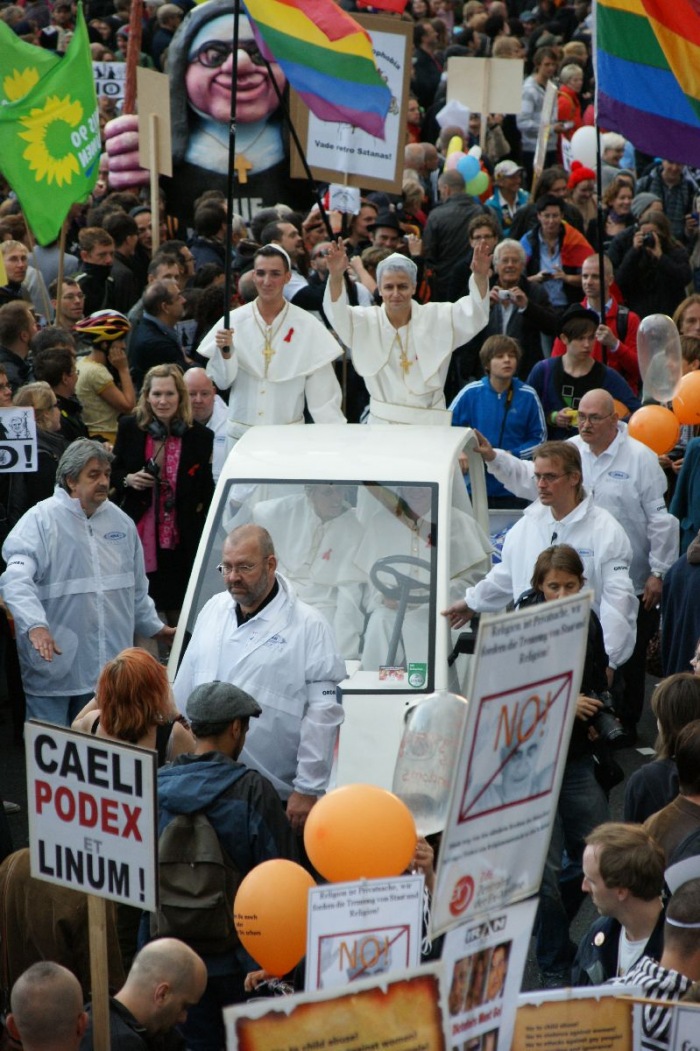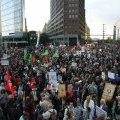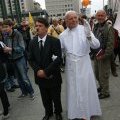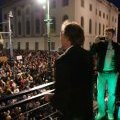"Exceptionally Embarrassing"
Politics and media ignored protests and celebrated the Pope

demo1_0.jpg
Pope demo Berlin, Photo: David Farago
It was the largest church-critical demonstration that has ever taken place in Germany: Approximately 15,000 people took to the streets in Berlin on September 22 to protest against reactionary dogmas, discriminatory sexual policies, and unconstitutional privileges of the Catholic Church. There was also massive resistance at the other two stations of the Pope's visit to Erfurt and Freiburg. In leading German media, however, the loud protests were mentioned only marginally if at all. Instead they celebrated the Pope's speech in the German parliament as an "intellectual major event", even though Benedict XVI dug out long disproven positions before the parliament, which in the end amount to the abolition of secular legal norms.
"Keine Macht den Dogmen!" ("No power to dogmas!") was the slogan of the Berlin large-scale demonstration, to which around 70 organisations, including the Lesben-und-Schwulenverband Deutschland (Lesbian and Gay Association Germany), CSD Berlin, pro Familia and the Giordano Bruno Stiftung, had called. The cheerful, colourful demonstration went from Potsdamer Platz, where for instance Uta Ranke-Heinemann spoke, to the concluding protest on Bebelplatz, where David Berger ("Der Schein des Heiligen"), gbs spokesman Michael Schmidt-Salomon, and Mina Ahadi ("Central Council of Ex-Muslims") summed up the protesters' demands. Michael Schmidt-Salomon received applause in particular when he called on German politicians to "give up their false respect for the official church" and "finally do the job for which they are paid in a modern, open society". The "fainthearted attitude" that many politicians displayed towards the Pope is "unworthy of a democratic constitutional state".
Apart from a few exceptions, the reporting in the German media was also "unworthy". On television, radio, and in print media, the Pope was cheered on. Differences between tabloid journalism and feature pages increasingly disappeared - not only BILD (Europe's best-selling tabloid) celebrated "its" Pope, but also the "reputable" Frankfurter Allgemeine Zeitung (FAZ) cheerfully joined the pious choir of celebrations. That the FAZ titled its report on the Pope's speech in the Bundestag "Missionary of Reason" was described by gbs spokesman Michael Schmidt-Salomon as "particularly scandalous, since one must assume that the FAZ reporters, in contrast to other reporters, may have understood what the Pope was saying in the Bundestag".
Gross falsification of history
Schmidt-Salomon considered the Pope's assertion before parliament "that the idea of human rights and the idea of equality of all human beings was developed on the basis of the belief in a creator god" as a "gross falsification of history". After all, these rights had to be fought for by secular forces against the fierce resistance of the church believing in creation. For many decades popes, cardinals, and bishops condemned human rights as blasphemous self-assumption. This is just as indisputable a fact as the fierce protest of the Catholic Church against the equality of men and women in the German Basic Law. I can't imagine FAZ reporters being completely unaware of these historical backgrounds."
The idea of natural law as a basis for outdated moral concepts
According to Schmidt-Salomon, serious journalists should also know why Benedict XVI made "natural law", of all things, the central theme of his speech to the Bundestag: "Insisting on a natural-law justification of legal norms has certainly nothing to do with the convictions of a 'green pope', as poorly informed media commentators broadcast into the world. In fact, we are dealing here with the supposed 'naturalness' or 'unnaturalness' of human behaviour. Homosexual acts, for example, are regarded as 'unnatural' from the Catholic perspective of natural law, since they allegedly contradict the 'divine plan of salvation'. When Benedict XVI argued in his speech against positivism and in favour of natural law, he not only defended a philosophical position that had long since been refuted. Ultimately, he called for the reversal of the secular legal reforms of recent decades, such as the legalisation of abortions or the equality of homosexual partnerships. After all, the abolition of the old moral paragraphs, which introduced a wave of liberalisation in Germany from the 1970s onwards, was based on overcoming the very idea of natural law that the Pope so vigorously advocated in parliament."
Conclusion by the gbs spokesman: "The fact that the vast majority of parliamentarians and media reporters applauded the reactionary, pseudo-intellectual, papal nonsense is deserving of the rating 'exceptionally embarrassing!' I am sure that very few parliamentarians and journalists really share the Pope's reactionary ideas. Most of them may simply be too uneducated to understand what the papal defence of the natural law idea means. This does not cast a good light on the intellectual level of politics and media in Germany. Anyone who is not even able to correctly assess the transparent rhetoric of the Vatican can hardly be trusted to master difficult political tasks, such as solving the financial crisis. It is truly impossible to blame the people that so many of them have lost all confidence in politics."




